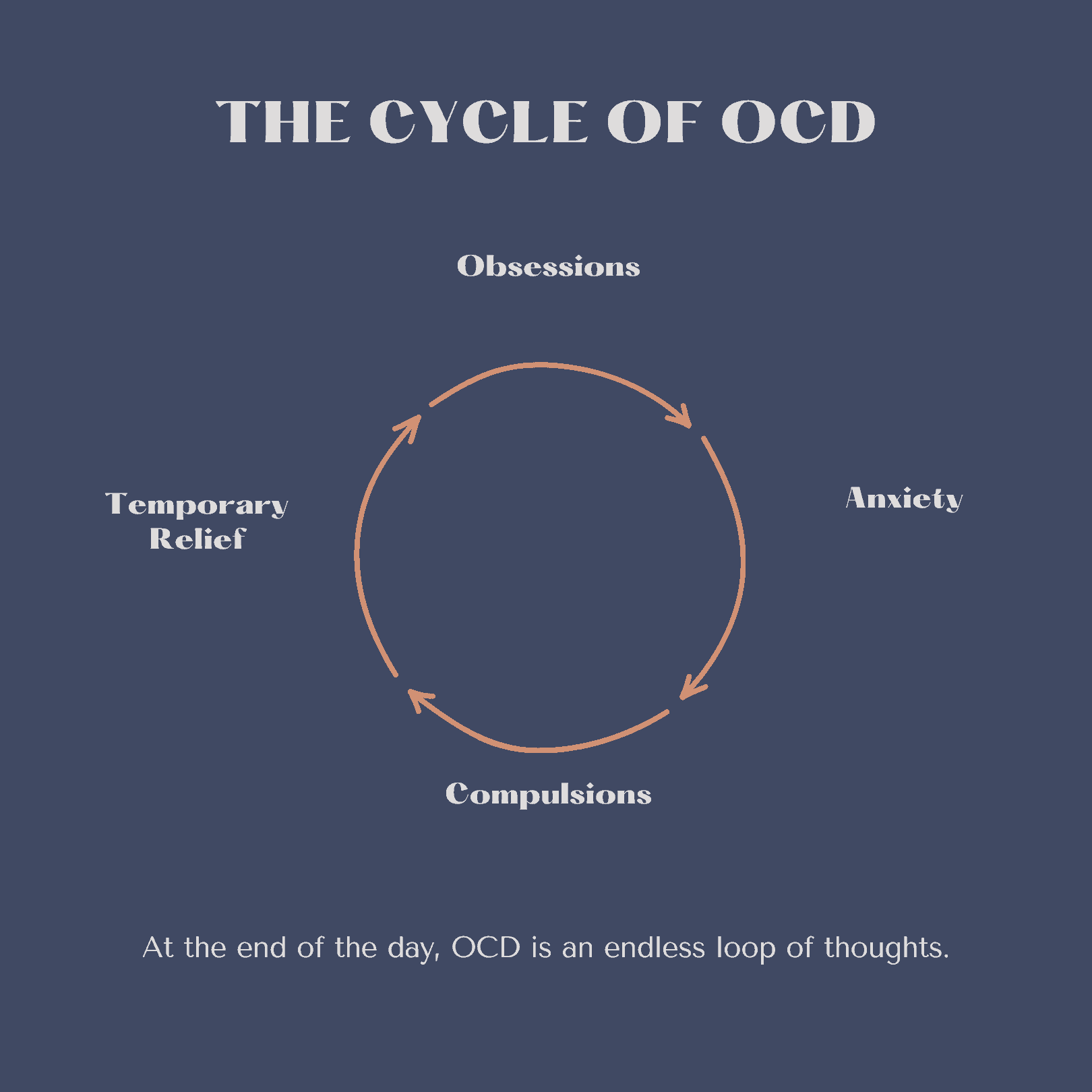How to Help Someone With Obsessive Thoughts
Medically Reviewed By – Juliet Gustafson, LMSW

Helping someone with obsessive thoughts is a heartbreaking experience. Seeing your loved one suffer day in and day out without being able to help them is very difficult. However, when dealing with mental health disorders, 1+1 does not always equals 2. In other words, mental health disorders can be very unpredictable. Thus, one should educate him/herself on the sheer nature of the disease, the ins and outs and what/how triggers symptoms before trying to be helpful.
This post was all about How to Help Someone With Obsessive Thoughts
What Are Obsessive Thoughts
Obsessive thoughts are better known as “obsessions” in today’s world. Obsessions are the unwanted thoughts, urges and/or mental images experienced by a patient with OCD. Obsessive thoughts are usually what gets the obsessive compulsive cycle going, that is experiencing obsession (X) followed by compulsion (Y).
Obsessions are frequent, repetitive and recur throughout the day. This is why OCD is such a tough mental health disorder to deal with, as it’s an endless cycle of obsessions and compulsions. This is why The World Health Organization (WHO) categorizes OCD as one of the top 10 leading causes of disability.
How To Help Someone with Obsessive Thoughts?
Obsessions are tough and will cause extreme levels of emotional pain, doubt, stress and anxiety. Althought you cannot “stop” your family members from experiencing their obsessive thoughts, there are ways you can support them without enabling the obsessive compulsive cycle. The strategies below can be used to help someone suffering from OCD and/or helping a loved one with the disease.
What are you waiting for? Download your FREE OCD Worksheets Now!
Don’t Engage in Reassurance Giving
Since OCD is known as the “doubt” disorder, people who suffer from the disease tend to struggle with continuous doubt, confusion and uncertainty. This is why people with OCD often ask for reassurance from friends and/or loved ones. This is a common practice and is considered compulsive behavior.
Examples of reassurance seeking
- Am I a bad person?
- Do I really love him/her
- Did I lock the door?
- Did I close the stove/gas
- Checking symptoms online (Health OCD)
- Checking if you ran over someone with your car
- Are my hands contaminated/dirty?
If your loved one comes to you seeking reassurance, you can respond with statements such as, “I care about you so I’m not going to give you reassurance” or “That sounds like your OCD talking. How can you use your OCD therapy skills right now?”

This is by far the most important and crucial concept to understand in hopes of controlling OCD symptoms. Knowledge is key, always. It is your responsibility to educate yourself (first) and your loved ones (second) about the ins and out of OCD. Getting to know the history of the disease, the sheer nature of OCD, how the disease feeds off of obsessions and triggers etc.
Understanding and knowing what you are dealing with will help you tremendously. Understanding when your loved one is engaging in OCD related behaviors is important. This will help you prevent helping them with their compulsions.
Moreover, it is extremely useful to know what and/or when OCD symptoms worsen/get triggered. Continuously observing and studying your OCD will greatly reduce stress and anxiety levels while keeping OCD under control.
Related Article(s) – Planning Care For A Patient With OCD
Be patient
Remember at all times that your loved one is not engaging in obsessions and/or compulsions from a place of comfort but from a place of pain and anxiety. It could feel helpless and frustrating when your loved one does not listen to your suggestions, encouragement and recommendations.
So, it is important to keep calm and be patient with this whole process. I know it is heartbreaking to see someone you care about suffer so much from imaginary pain but it’s your responsibility to make sure you offer words of advice, act tough in front of them and always remain patient.
Recognize Signals
As we discussed earlier, it is crucial to recognize OCD signals and trends. Since OCD is an endless cycle of obsessions and compulsions that repeat over time, it becomes easier to identify trends.
Knowing what triggers your symptoms is critical to controlling your emotions and reactions. This means you may anticipate a spike in symptoms, which will help ease the pain.
Help them Seek OCD Treatment
Mental health patients in general to delay therapy and treatment. This is due to the increased stigma associated with mental disorders and the fear of losing respect/being judged when talking about weird irrational obsessive thoughts.
However, it is your responsibility to encourage your loved one suffering from OCD to have an open mind regarding therapy, recovery and going through treatment. Encourage your loved one to find a therapist who specializes in obsessive compulsive disorder.
Related Article(s) – Three Evidence-Based Treatments For OCD
Are You Enabling Their Symptoms?
While supporting a friend and/or a family member with obsessive compulsive disorder, individuals must ask themselves an important question, “am I enabling?” If the answer is “NO”, great. However, if the answer is a “Maybe and/or Yes” then an immediate change of approach is imminent. That’s why learning how to help someone with OCD is so important.
What is Meant By Enabling
Any actions, words, or behaviors that support OCD symptoms or rituals are considered to be OCD enablers. Enabling OCD makes it more difficult for your loved one to heal and unintentionally reinforces the disease.
Why Parents Accommodate OCD
If you are taking care of a loved one with OCD, you know that it’s not that simple. With all the emotions, frustrations and pressure, you may accidentally find yourself enabling your loved ones symptoms. Although these behaviors and accommodations come from a place of love and care, these behaviors reinforce OCD, increasing symptom frequency and severity in the long run.
Moreover, studies have reported high rates of family accommodation among parents of children with OCD, suggesting that up to 60–96% of relatives assist or modify their behavior to accommodate their child’s OCD symptoms. Furthermore, According to The Theoretical Cognitive-Behavioral Therapy (CBT) framework, FA hinders CBT effectiveness by reinforcing OCD fears and avoidance.
Reasons You May Enable OCD behavior
- You want to Help – Many people wrongly feel that by accommodating their loved one’s OCD, they are helping them control the disease.
- You Feel Helpless – You are trying your hardest to not trigger their feelings and thoughts but nevertheless it continues to control your loved one.
- You are Fearful – You are afraid and terrified with how your loved one is thinking and acting, you slowly believe his/her intrusive thoughts and thus enabling symptoms
Complete The OCD Y-BOCS Test to determine your symptom severity!
What You Need to Know About OCD
Believe it or not, obsessive compulsive disorder is not rocket science, it’s a very straightforward mental health disorder. However, being a simple disorder does not necessarily mean it’s a shallow problem. obsessive compulsive disorder is a very deep mental health topic consisting of hundreds upon hundreds of subtypes and symptoms. Moreover, Adolescents and Teens According to the International OCD Foundation, at least one in every 200 adolescents and teens in the US is suffering from the mental illness.
The Obsessive Compulsive Cycle

obsessive compulsive disorder can impact a person in a variety of ways. It may obstruct daily duties, reduce your general quality of life, and cause significant anxiety. Obsessive Compulsive Disorder frequently results in a certain pattern of thoughts and actions in the form of never-ending cycles. If you find yourself struggling with intrusive thoughts, repetitive behaviors, or compulsive rituals, or if you need extra help managing your obsessive thoughts, don’t hesitate to reach out for a professional ocd specialist
- Obsession – is when an unpleasant and recurring thought, image, or drive consumes your thoughts.
- Anxiety – Something that causes serious worry or distress.
- Compulsion – is the term for compulsive recurring actions or thoughts. These can be a reaction to the pattern of obsessive thoughts.
- Repetitive behaviors, aimed at reducing the anxiety, are characteristic of the disorder and can become very time-consuming and demanding.
- Temporary relief – Compulsive behavior temporarily reduces the level of anxiety. Since the effects they have are short-lived, obsessions will resurface, repeating the cycle.
What Are Triggers
obsessive compulsive disorder and triggers are closely related. Anything that “provokes a specific feeling or memory” is a trigger. Triggers by their very nature affect the kind and intensity of symptoms.
People, locations, songs, and names are examples of triggers. Basically everything that can start the obsessive-compulsive cycle. Obsessions, in other words, cause anxiety and negative feelings, which are then countered by activities and behaviors known as compulsions.
Related Article(s) – What Are OCD Triggers And How To Deal With Them
Understanding Intrusive Thoughts
As the name suggests, intrusive thoughts are thoughts that force their way into your head without you thinking about them. Intrusive thoughts are mostly irrational, disturbing, violent, bizarre and flat out weird. These intrusive thoughts cause massive amounts of stress, anxiety and pain. According to the American Psychiatric Association, obsessive thoughts might take the form of negative self-talk.
Although all human beings experience intrusive thoughts, someone who has obsessive compulsive disorder tends to “latch” onto them. He/she will begin to listen, observe and potentially believe them. Thus triggering the obsessive compulsive cycle. While obsessive thinking is a normal part of human nature, it can also be a symptom of various mental illnesses
How to Live with Someone With OCD
Living with someone with OCD is not an easy task at all.You may struggle to understand their experiences, or feel that their ocd thoughts and compulsions get in the way of daily life. It will take a great deal of effort, bravery and patience to support your loved one(s).
However, since we are humans after all, we tend to give in to certain pressures such as engaging in reassurance. Nevertheless, there are a couple of rules everyone should abide by when living and supporting someone with OCD.
Don’t Accommodate Someone With OCD
Accommodation is a common and widely studied phenomenon in families of youth with obsessive‐compulsive disorder . Accommodation has been associated with increased symptom severity, poorer functional outcomes, and reduced treatment response, according to The Journal Of Clinical Psychology.
Accommodations mean that you are implicitly encouraging your child to give in to obsessive and compulsive behaviors. This might happen if you don’t want to upset your child so you start complying with his/her orders, making symptoms worse.
Want More on OCD? Checkout our Must Read OCD Book List!
When someone is accomodating a specific obsession he/she is becoming an enabler of the disease. This only makes things worse and will strengthen symptom severity within your child.
We start to acknowledge an obsession or intrusive idea as soon as we give in to it, giving it weight and strength. Participate in avoidance behavior – Don’t over-accommodate in an effort to help your person suffering avoid things that might upset them.
What Accommodation In OCD Looks Like
- Washing your hands before hugging your child
- Avoiding a certain street/avenue that makes him/her uncomfortable
- Providing reassurances
- Locking the doors of the house more than once
- Organizing the table just how your child likes it
Encourage OCD Treatment
Encouraging treatment is not an option but a responsibility. As we discussed earlier, most people tend to delay treatment and therapy as much as possible (I experienced this first hand). It is your responsibility to slowly encourage, seek treatment and change the perception of treatment to your family members.
Additionally, support groups are available for those suffering from OCD.Encourage them to seek treatment from a professional who is experienced in treating OCD. Moreover, try scheduling an appointment with a mental health professional so that your loved one could talk with them and feel comfortable with the idea of treatment.
Provide Emotional Support
OCD patients are very sensitive, vulnerable and sometimes paranoid. Feel free to talk about what they are dealing with, discussing their intrusive thoughts and compulsions while providing emotional support and guidance.
Moreover, try to act brave in front of your suffering family members as they need to know that they have someone backing them up. Furthermore, it is recommended to spend as much time with your loved one as possible as you will (A) have them busy and (B) comfort them as much as you can.
Related Article(s) – Is OCD Treatable Without Medication?
Create a Supportive Environment
The first step is to encourage them to discuss the problem with a family doctor or qualified mental health professional. provide a supportive environment, avoid criticizing your loved one’s actions.
Acceptance is a good start, but try to motivate them to make improvements while they go about their daily business. Reinforce positive communication and behaviours (such as sharing, hugs and helping each other)
Final thoughts on How To Help Someone With Obsessive Thoughts
All in all, helping someone with obsessive thoughts is a tough job as OCD will likely have the upper hand in this situation. Unfortunately, due to the lack of knowledge regarding OCD and the stigma surrounding it, parents may accidentally reinforce obsessive thoughts.In order to be able to help someone with OCD, you may benefit from understanding the ins and outs of the disorder.
However, There are a number of treatment options out there that have proven beneficial for OCD. Although thinking about your loved one taking psychiatric medications can be an unnerving thought, be sure to support the doctor’s assessment.
This post was all about How To Help Someone With Obsessive Thoughts




